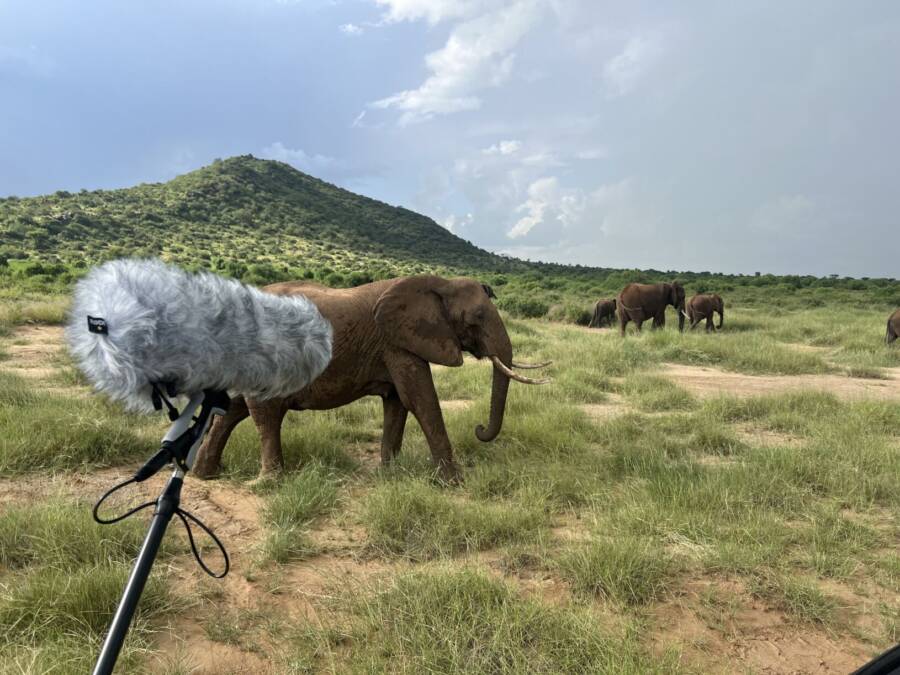Based on an analysis of more than 400 elephant rumble recordings, researchers determined that elephants, much like humans, use specific, unique sounds to refer to one another.

Harshil Gudka/UnsplashResearchers determined that African elephants use individualized name-like sounds to call to one another.
African elephants are among the smartest animals on Earth. Now, a new study suggests they could be even more intelligent than most people realize. The study, published in the journal Nature Ecology & Evolution, claims elephants do something few other wild animals do: call each other by their names.
These names come in the form of low rumbles called out over the vast expanses of the savanna. Researchers described this rumble as “a harmonically rich, low-frequency sound that is individually distinct.”
In short, these are name-like sounds used by elephants to identify one another.
This discovery, researchers said, “radically expands the expressive power of language” and “could have important implications for our understanding of language evolution.”
How Elephants Use Low Rumbles To Identify Each Other
While it is common for humans to address each other by an individualized name, this behavior is rarely observed in other animal species. Dolphins, for instance, come up with their own names, called “signature whistles.” Parrots likewise can imitate signature calls made by an individual as a means of addressing them.
In this sense, human names differ because they are not imitations of sounds made by the referent, but rather individualized, abstract sounds used to address an individual.
“Dolphins and parrots call one another by ‘name’ by imitating the signature call of the addressee,” Michael Pardo, the study’s lead author and a Colorado State University postdoctoral researcher, said in a press release. “By contrast, our data suggest that elephants do not rely on imitation of the receiver’s calls to address one another, which is more similar to the way in which human names work.”
In their study, researchers analyzed 469 elephant rumble samples sorted into three distinct varieties: contact, greeting, and caregiving.
“Contact rumbles are long-distance calls produced when the caller is out of sight and more than ~50 m from one or more social affiliates and attempting to reinitiate contact,” study authors explained. “Greeting rumbles are affiliative calls produced when one individual approaches another to within touching distance. Caregiving rumbles are affiliative calls produced by an adult or adolescent female while suckling, comforting, or rousing a calf.”
A Phenomenon Previously Only Seen In Humans

George WittemyerResearchers recording elephant vocalizations in Kenya.
The researchers spent four years studying African elephants, including 14 months of field work in Kenya in which researchers followed the animals in a vehicle and recorded their vocalizations.
The team collected 469 sound samples and processed them through a machine-learning model. Researchers were able to identify the recipients of 27 percent of those calls, likely because in those instances the elephant was being called by its “name.”
The researchers then played back recordings of the elephants’ calls out loud and observed the responses of 17 elephants in the wild. Astonishingly, the elephants responded affirmatively to calls addressed to them, but had far weaker reactions to recordings of calls made to other elephants.
Of course, more research is needed to officially confirm these new findings. Still, if this new data is anything to go on, researchers may have just discovered a fundamental new landmark in the history of language development.
“If further research supports the absence of receiver imitation in elephant vocal labels, then investigating the social context, acoustic structure, and ontogeny of vocal labels in elephants may shed light on why elephants and humans developed non-imitative vocal labels in contrast to other species known to vocally label conspecifics,” researchers wrote.
“Our results also have significant implications for elephant cognition, as inventing or learning sounds to address one another suggests the capacity for some degree of symbolic thought.”
After reading about this fascinating new study on elephants, check out our list of 21 fascinating elephant facts. Or, read the shocking story of Topsy the elephant and her public execution.





